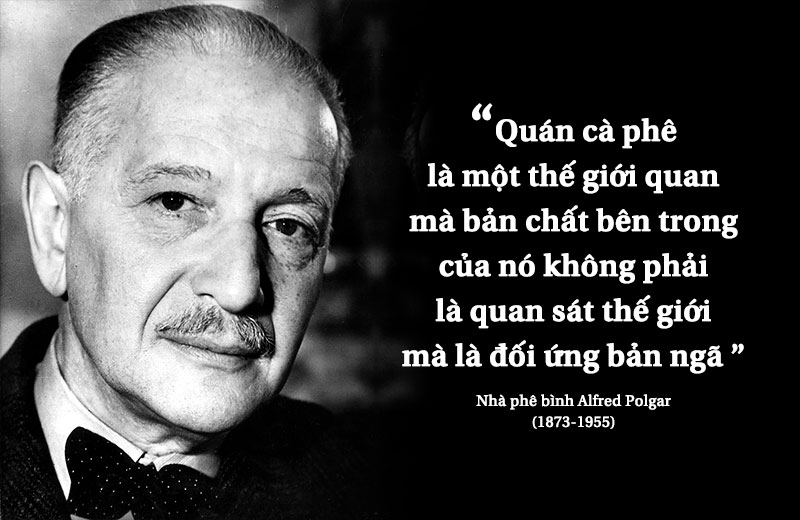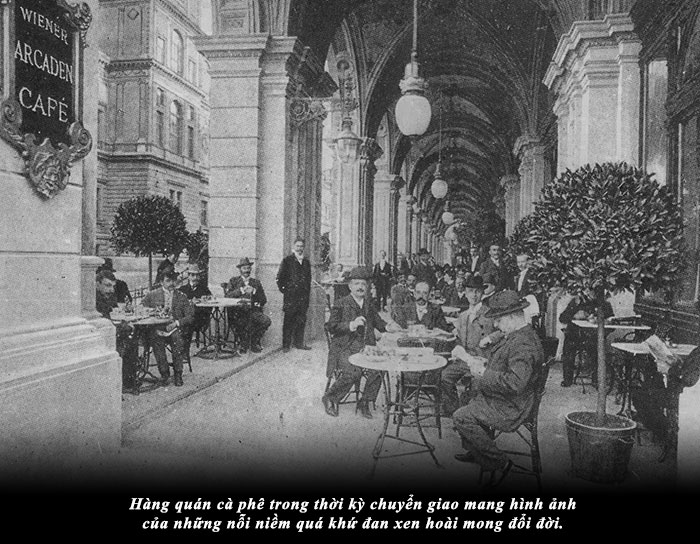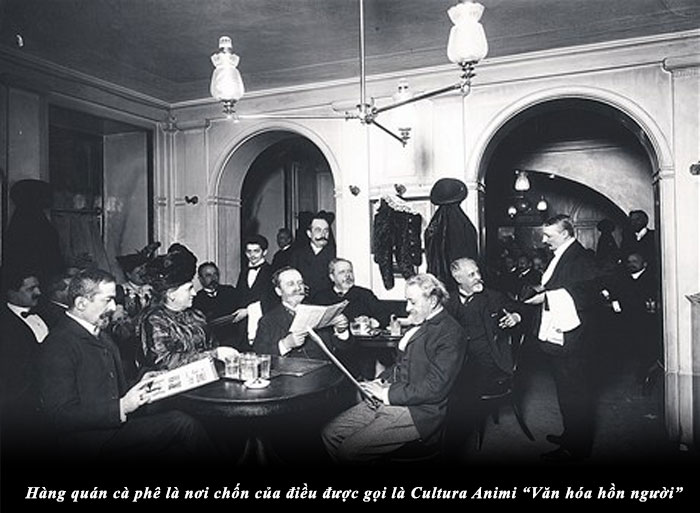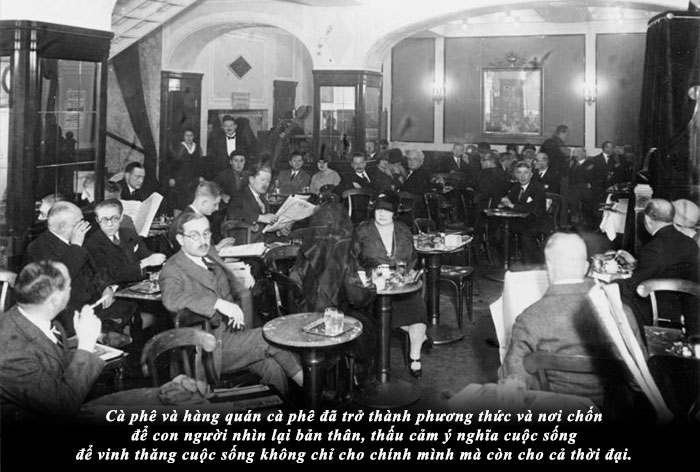Article 34: Coffee shops in the “Human soul culture” revolution
Humans have always pondered and solved the secrets of the universe and humanity. The development of science has partially explored the material world, and continues to decode the signs of thinking consciousness…

“The coffee shop is a worldview whose inner essence is not observing the world but reciprocating the ego.” – Alfred Polgar (1873-1955)
The 19th century saw the explosion of the Industrial Revolution and advances in science and technology. Humans rely on knowledge to consciously explore and transform nature to serve their needs for existence and development. People work hard to create happy values but end up mistakenly assimilating happiness with material accumulation. The role of knowledge has thus become a tool for advancement, an “asset” to compete with life.
The carelessness of rational calculations in human-to-human relations, along with the harsh operation of soulless science and technology, pushed Europe into a new crisis. The huge industrial cities created a large population displacement wave, accompanied by class conflicts, ethnic conflicts, religious tensions, and increasingly diverse and complex social relations. Society fell into a state of political conflict, moral degradation, rich-poor division, population explosion, etc.

The cafe was a gathering place for politicians, philosophers, scientists, scholars… to enjoy coffee, read books and discuss the aspirations of the times.
The end of the 19th century and the beginning of the 20th century was called the period of the transition of the era, characterized by the fluctuation of the soul. One side tended to be pessimistic with reality, tired of life, seeking relief in vanity, decadence. One side was full of faith in the future, optimism about the world and the ability to create a new good world.
The Great Depression was evident in Vienna (the capital of Austria) – the historical interface between the Eastern European basin, embracing the universal ideology that dominated east of the Rhine and the individualism prevailing in Western Europe. Around 1900, Vienna was the center of thought and culture of Europe. The influx of immigrants caused the city’s population to increase dramatically, creating a society that was a mixture of nationalities, languages, beliefs, and worldviews. The context of ethnic turmoil became the driving force behind the sense of discovery of common ground behind social diversity. Viennese cultural elites encouraged intellectual interference to jointly shape the path to shared happiness in modern life.
During this transition period, cafes were part of the urban cultural space of Vienna. The cafe acted as a research club with hundreds of free press publications and was a trusted place to share personal views. Therefore, the coffee shop was a gathering place for politicians, philosophers, scientists, scholars… to read or debate current aspirational issues, about the “soul revolution” to seek human nature and the role of people in the worldview… From here, the coffee shop became the birthplace of important psychological theories in the 20th century.
Café Landtmann was where Sigmund Freud researched and founded the psychoanalytic theory detailing the structure, dynamics and development of the human personality. Café Korb was famous for its weekly debates by the Psychoanalytical Society of the great psychoanalytic thinkers of the century such as Sigmund Freud, Alfred Adler, Wilhelm Reich, Otto Rank, Karl Abraham, Carl Gustav Jung… to clarify the model of the human mind.

The coffee shop was the place of what was called Cultura Animi “soul culture”
From his insights into personality structure at Café Korb, psychologist Alfred Adler initiated the theory of Individual Psychology. In 1912, he founded the Society of Personal Psychology, often meeting at Café Siller, or Café Central. His theory promoted human perfection in institutional relationships – social environment. From there, the concept of Style of Life was developed in the sense that people should freely choose their own destiny and strive to fulfill it. Also from the Psychoanalytic Society, doctor Carl Gustav Jung founded the theory of Analytical Psychology, focusing on spiritual phenomena, the interrelationship issues between thought and culture as the center of the study of the human mind. His thought greatly influenced modern spiritual movements such as New Age, Oxford Group.
At Café Arkaden, Café Herrenhof, Café Reichsrat, Café Central, philosopher Ludwig Wittgenstein and a group of intellectuals Wiener Kreis in the fields of philosophy, natural sciences, social sciences,… promoted thoughts of Logical Positivism – one of the most influential philosophical trends of the 20th century. On his philosophy, Wiener Kreis revolutionized the transmission of knowledge, making knowledge accessible to the public diversity.

Coffee and coffee shops became a way and a place for people to look at themselves, understand the meaning of life to enhance life not only for themselves but also for the times.
It can be said that the history of development of psychoanalytic theory, psychology was closely related, or precisely motivated from meetings in coffee shops. The intelligentsia lived in the midst of social and moral crises and was therefore driven to seek answers about the path to happiness. If the industrial revolution did not bring happiness from the feeling of material satisfaction, the spiritual revolution with the introduction of psychological theories would partly reveal the nature of happiness in the mental space. Thereby guiding people to pursue happiness from cognitive capacity, establishing the correctness in behaviors and attitudes towards the community and with the shared culture.
When people clearly understand the reason for living, know the way to strive as an individual, a member of the community of people who try to reach for higher moral values, people will have a feeling of complete happiness. In other words, happiness lies in the desire to perfect the personality, perfect the soul vibrations. It is also the driving force of life, the driving force of human development. Once the happiness of each individual is built on the truth of the soul, it will foster the universal happiness of the nation and the people.
Thus, coffee and coffee shops have become a way and a place for people to look at themselves, understand the meaning of life, about the past feelings interwoven with the desire to change their lives.
THE REAL COFFEE
ROASTED ONLY FOR PEOPLE OF WISDOM!
Source: “The Philosophical Way of Coffee” – copyright by Trung Nguyen Legend


